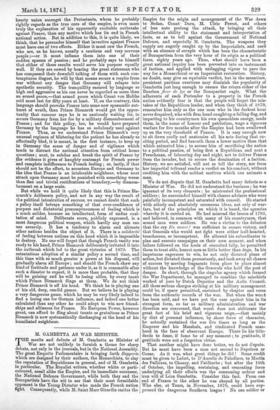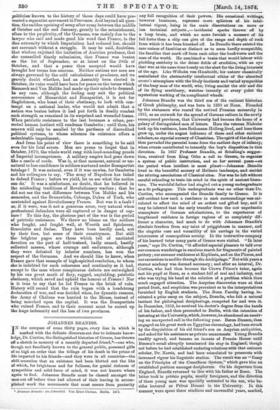M. GAMBETTA AS WAR MINISTER.
THE merits and defects of M. Gambetta as Minister of War are not unlikely to furnish a theme for sharp debate, not only in the journals, but in the National Assembly. The great Enquete Parlementaire is bringing forth Rapports which are designed by their authors, the Monarchists, to slay the reputation of Republicans in general, and of M. Gambetta in particular. The Royalist writers, whether white or parti- coloured, assail alike the Empire, and its immediate successor, the National Defence Government, while both they and the Bonapartists have the wit to see that their most formidable opponent is the Young Dictator who made the French nation fight. Consequently, while M. Saint Marc Girardin smites the
Empire for the origin and management of the War down to Sedan, Count • Darn, M. Ulric Perrot, and others of less note prolong the attack, by bringing all their intellectual ability to the statement and interpretation of facts, so as to tell against the Government of National Defence, and especially M. Gambetta. The weapons they supply are eagerly caught up by the Imperialists, and used with an absence of scruple which has been the characteristic of Bonapartism from the very hour of its origin as a political force, eighty years ago. Thus, what should have been a great national inquiry has been perverted into an instrument of faction, and applied with unflagging vigour to pave the way for a Monarchical or an Imperialist restoration. History, no doubt, may give an equitable verdict, but in the meantime, persistent partisan exertions may diminish the popularity of Gambetta just long enough to ensure the return either of the Bourbon fleur de lys or the Bonapartist eagle. What the adherents of each Pretender to a property in the French nation evidently fear is that the people will forget the mis- takes of the Republican leader, and when they think of 1870, remember him only as the one man who in the darkest hour never despaired, who with firm hand caught up a falling flag, and imparting to his countrymen his own quenchless energy, made them, in the name of honour and patriotism, wage a vigorous warfare for five months after the Empire had been swallowed up on the very threshold of France. It is easy enough now to sit down coolly and anatomise all his acts during that ex- citing period, and find beneath them a lower motive than that which animated him ; to accuse him of sacrificing the nation to a political passion, of being first a Republican and next a Frenchman, of labouring day and night, not to deliver France from the invader, but to secure the domination of a faction. History, we are satisfied, will not so tell the story, nor from her impartial tribunal render a verdict on his conduct, without crediting him with the noblest motives which can animate a man.
We do not dispute that M. Gambetta had many defects as a Minister of War. He did not understand the business ; he was ignorant of its very elements ; he mistrusted the professional soldiers ; he surrounded himself with chance advisers who were painfully incompetent and saturated with conceit. He started with utterly and absolutely erroneous ideas, not only of war- fare, but of the principles on which it is based, the agencies whereby it is carried on. He had misread the lesson of 1793, and believed, in common with many of his countrymen, that armed men were soldiers. He was a victim to the delusion that the cry En avant ! was sufficient to ensure victory, and that Generals who would not fight were either half-hearted, treacherous, or incompetent. He allowed his subordinates to plan and execute campaigns on their own account, and when failure followed on the heels of conceited folly, he permitted them to treat able, honest men as little better than dogs. In his impetuous eagerness to win, he not only dictated plans of action, but dictated them prematurely, and took away all chance of success by moving fragments from place to place almost without the knowledge of the Generals who held the post of danger. In short, through the singular agency which formed the War Department, he managed to combine the mischiefs worked of yore by Dutch Deputies and the Aulic Council. All these serious charges striking at his military management could be, if space permitted, sustained by chapter and verse from the authentic records of the war. But when the wont has been said, and we have put the case against him in its strongest form, so far as military administration and war direction are concerned, that worst does not obliterate the great fact of his brief and vigorous reign,—that mainly by dint of personal influence, by sheer force of character, he actually sustained the war five times as long as the Emperor and his Marshals, and vindicated French man- hood in the face of observant Europe. There lie his title- deeds to fame, if fame be of any moment ; to gratitude, if gratitude were not a forgotten virtue.
That another might have done better, we do not dispute. Bat he must have been a man not second to Napoleon or Csar. As it was, what great things he did ! Some credit must be given to Lefort, to D'Aurelle de Paladines, to Martin des Pallieres, to Chanzy, and Faidherbe ; but after the 10th of October, the impelling, sustaining, and cementing force underlying all their efforts was the consuming ardour and iron will of Leon Gambetta. Consider this fact. From one end of France to the other he was obeyed by all parties. Who else, at Tours, in November, 1870, could have sup- pressed the dangerous Southern league ? No one soldier or
politician known to the history of those days could have pre- vented a separatist movement in Provence. And beyond all ques- tion, the sudden uprising of army after army between the middle of October and the end January, greatly to the astonishment, 'Men to the pezplexity, of the Germans, was mainly due to the lawyer who said and made good his word that France, in the dire extremity to which Imperialism had reduced her, should not succumb without a struggle. It may be said, doubtless, that wisdom enjoined the imitation of Austrian prudence, that she counselled timely submission, that France was beaten on the 1st of September, or at latest on the 28th of October, and that a peace then accepted would have brought her terms less onerous. Neither nations nor men are always governed by the cold calculations of prudence, and we gravely doubt whether, had an Assembly been elected in October, its voice would have been for peace on the terms which Bismarck and Von Moltke had made up their minds to demand. Is any case, although the feeling may suit the political convenience of Monarchist and Bonapartist, it is not for Englishmen, who boast of their obstinacy, to look with con- tempt on a national leader, who would not admit that a zation, was beaten before it had put forth in deadly combat such strength as remained in its surprised and wounded frame. When patriotic resistance to the last becomes a crime, per- verted human instinct will condemn Gambetta ; until then, his renown will only be assailed by the partisans of discredited political systems, to whose schemes its existence offers a redoubtable impediment.
And from his point of view there is something to be said oven for his fatal errors. Men are prone to forget that in October, 1870, the whole world rang with loud-sounding proofs of Imperial incompetence. A military empire had gone down like a castle of cards. Was it at that moment, natural or un- natural to lose confidence in soldiers nurtured under Bonapartist, tutelage ? It was natural, even if it was unwise, for Gambetta and his colleagues to say, The army of Napoleon has failed to defend France ; before we yield, let us see what the nation fan do.' It was a misfortune, no doubt, that he believed in the misleading traditions of Revolutionary warfare ; that he did not see the vast difference between Von Moltke and his sonarades, and the Brunswicks, Coburgs, Dukes of York, who contended against Revolutionary France. But was it a fault ? or, if it were, was it not a generous error, very natural when professional defenders were all captured or in danger of cap- ture? To this day, the glorious part of the war is the period a patriotic resistance. We throw no blame on the soldiers who fought, and fought well, at Woerth and Spicheren, Oravelotte and Sedan. They have been hardly used, nob- by their foes, but some of their countrymen. But still the brighter pages are those which tell of unstinted devotion on the part of half-trained, badly armed, hastily collected masses, whose courage and endurance, although they were defeated by inferior numbers, has won the respect of the Germans. And we should like to know, when France gave that example of high-spirited resolution, to whom she is indebted for such coherence and continuity as it had, except to the man whose conspicuous defects are outweighed by his one great merit of fiery, rugged, unyielding, patriotic obstinacy, which saved and upheld the honour of France ? Nor in it true to say that he led France to the brink of ruin. History will record that the ruin began with a headstrong declaration of war, and was decided when, for dynastic reasons, the Army of Chillons was hurried to the Meuse, instead of being marched upon the capital. It was the Bonapartists who ruined France, and to their account must be scored up the huge indemnity and the loss of two provinces.

































 Previous page
Previous page